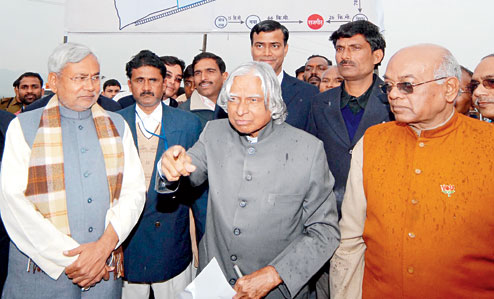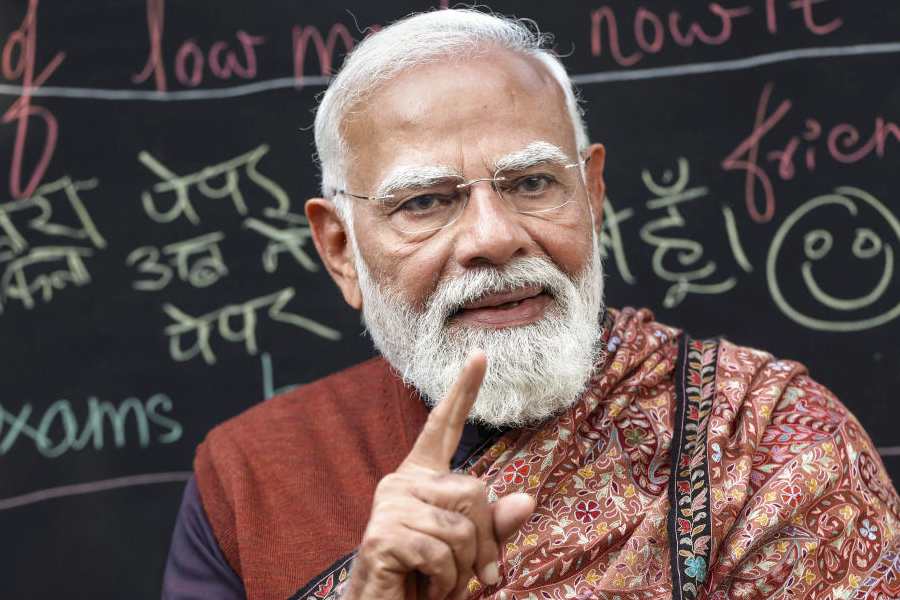
February 8, 2008. Picture by Deepak Kumar
Be it premonition or just coincidence, Nitish Kumar had shared his fond memories of APJ Abdul Kalam with The Telegraph on Sunday afternoon — a day before the former President suddenly passed away in Shillong.
“Kalam sahib was the first Visitor of Nalanda University. We wanted him to continue as its Visitor even when he was not the President. I had personally gone to request him (in September 2011) to continue as its Visitor. But he declined, pleading that the incumbent President (Pratibha Patil) should be the Visitor in the best interest of the university,” the chief minister reminisced.
It was not that there was a context for Nitish to dwell on Kalam. This reporter had sought the chief minister’s reaction to Nobel laureate Amartya Sen not being considered for a second term as Nalanda University chancellor. But Nitish, not usually known to deviate from the context, impulsively turned back to history, recalling how Kalam was the first to moot the idea of the revival of the ancient seat of learning.
“It was rare for a President to address a state legislature. But Kalam sahib accepted my invitation to address the joint session of the Bihar legislature on March 28, 2006. While addressing the session that we had specially convened for him, the then President mooted the idea of the international university on the ruins of the ancient seat of learning at Nalanda and also suggested a 10-point programme to usher in an era of progress and prosperity in the state,” Nitish said.
Nitish, leaving other topics aside, spoke for at least 10 minutes on Kalam on Sunday, recalling how the “missile man”, as the former President was referred to, was ready to render his services to Nalanda University in particular and Bihar’s progress in general.
“On our invitation he kept visiting Bihar and guiding us even when he was not the President. He visited brinjal farms at Paliganj and Naubatpur (on the outskirts of Patna) and guided the farmers with his knowhow of the cultivation of the modern variety of paddy. He always reminded us about the glorious tradition of Bihar and suggested that we preserve the state’s great culture and tradition,” the chief minister said.
“I had met Kalam sahib to seek his guidance for making a science city in Bihar. He gave all his suggestions and guidelines. He is unassumingly simple, always ready to guide and help us,” he added.
Barely 30 hours after Nitish shared his many personal experiences about Kalam with The Telegraph came the news of the former President’s sudden demise.
“It is a colossal personal loss for Kalam always acted as our guardian and guide, showing the light of progress, growth and optimism. His death is an irreparable loss to Bihar in particular and the nation in general,” Nitish said in his first reaction last night, his voice heavy.
Nitish today declared that the newly built Kishanganj Agriculture University would be renamed Doctor Kalam Agriculture University as a tribute to the former President.
Suspending all his scheduled programmes, Nitish flew off to New Delhi at 12.50pm to pay his homage to Kalam.
Before leaving for Delhi, Nitish said: “In my understanding, if there was one person who influenced the young generation most in the current phase, it was Kalam. He greatly attracted the youths. He had vision for the progress of India. He was conferred with the Bharat Ratna on the basis of his work in science. But he was a ratna (jewel) of Bharat in the real sense.”
“He was the most popular President. He was the people’s President. He loved teaching the students even in his advancing age. He suddenly died while delivering a lecture among the students. Rare people are blessed to get such a death. He epitomised what is known as greatness,” Nitish said.










